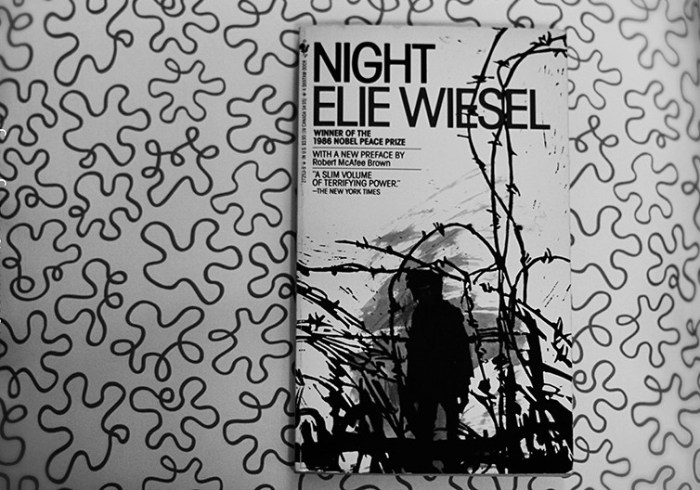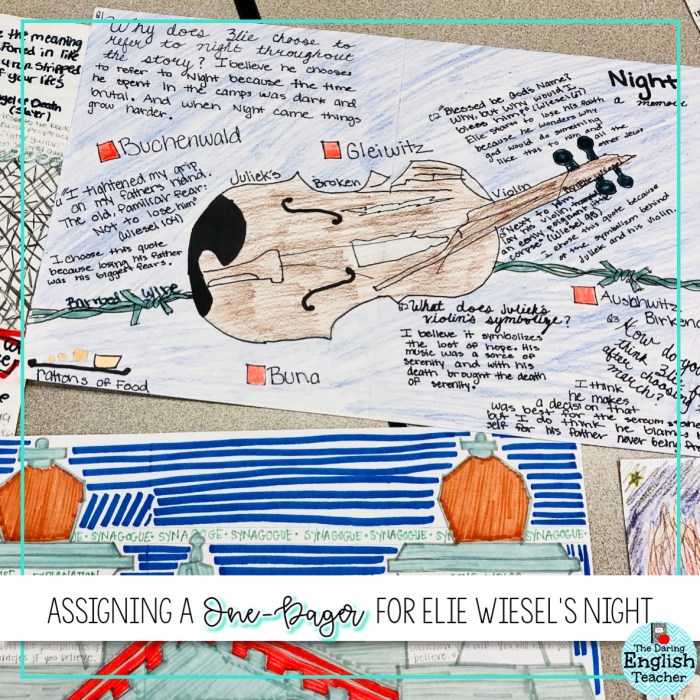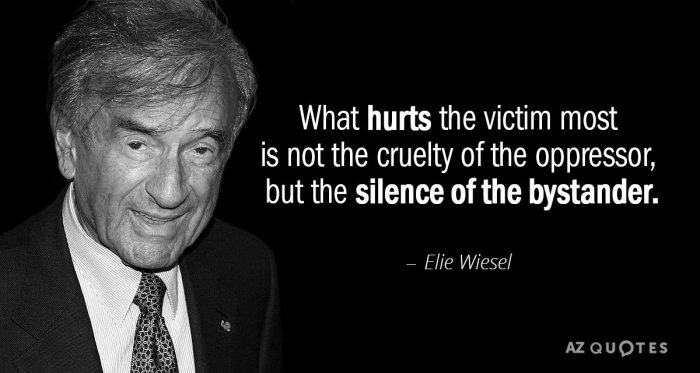One pager night elie wiesel – Delve into the poignant and profound world of Elie Wiesel’s “One Pager Night,” a literary masterpiece that offers a deeply personal and evocative exploration of the human condition.
Through the lens of a single night, Wiesel unravels a tapestry of themes and emotions, inviting readers to confront the darkness and seek the light within the human soul.
Introduction

A “one pager” in literature refers to a concise, single-page document that presents a comprehensive overview of a specific topic or work.
Elie Wiesel’s “One Pager Night” is a notable example of this format, encapsulating the key themes, characters, and events of his renowned memoir, “Night,” in a single, thought-provoking page.
One Pager Night by Elie Wiesel is a powerful and moving account of the Holocaust. The book’s stark prose and unflinching honesty have made it a classic of Holocaust literature. For those who are interested in learning more about the Holocaust, I recommend reading One Pager Night.
It is a difficult but important book that will stay with you long after you finish it. To learn more about other topics related to the Holocaust, such as the air gap 3 compartment sink , you can explore various online resources.
Historical Context

The Holocaust, a systematic genocide orchestrated by Nazi Germany during World War II, profoundly impacted Elie Wiesel’s life and writing. His experiences as a Jewish prisoner in Auschwitz and Buchenwald concentration camps left an indelible mark on his psyche and shaped his perspective as an author.
Wiesel’s writing in “One Pager Night” reflects the horrors he witnessed and endured during the Holocaust. His vivid descriptions of the atrocities committed against Jews convey the brutality and dehumanization that characterized the Nazi regime. The work also explores the themes of faith, survival, and the search for meaning in the face of unspeakable suffering.
Impact of the Holocaust on Wiesel’s Perspective
- Wiesel’s personal experiences in concentration camps led him to question the existence of God and the nature of good and evil.
- The Holocaust shattered his faith and left him with a deep sense of disillusionment and skepticism.
- His writing reflects his struggle to reconcile the horrors he witnessed with his belief in a just and compassionate God.
Themes and Motifs

“One Pager Night” explores profound themes that resonate with readers on a deep level. The motif of the “night” permeates the work, symbolizing the darkness, fear, and oppression that the Jewish people endured during the Holocaust. The novel also delves into the themes of faith, hope, and the search for meaning amidst adversity.
The Holocaust
The Holocaust, a horrific genocide perpetrated by the Nazis, serves as the backdrop for “One Pager Night.” The novel unflinchingly depicts the atrocities committed against the Jewish people, highlighting the inhumanity and suffering they endured. Through Elie Wiesel’s personal experiences, the novel provides a powerful indictment of the horrors of war and the fragility of human life.
The Power of Faith
Despite the unimaginable suffering, Elie Wiesel’s faith in God remains unwavering. He finds solace and strength in his prayers, which become a lifeline amidst the darkness. However, the novel also explores the complexities of faith in the face of such adversity, questioning whether it is possible to believe in a benevolent God who allows such horrors to occur.
The Search for Meaning
In the aftermath of the Holocaust, Elie Wiesel grapples with the question of meaning. He seeks to understand why such atrocities were allowed to happen and what lessons can be learned from them. The novel suggests that meaning can be found in bearing witness to the past, remembering the victims, and fighting against injustice and oppression.
Literary Techniques
Elie Wiesel employs a range of literary techniques in “One Pager Night” to convey the horrors of the Holocaust and its enduring impact on survivors.
One striking technique is the use of symbolism. The night itself becomes a symbol of the darkness and despair experienced by the prisoners in the concentration camps. The “one pager” represents the fragile hope and resilience that sustained them amidst the horrors.
Imagery
Wiesel also uses vivid and haunting imagery to evoke the physical and emotional suffering of the prisoners. He describes the “stench of burning flesh” and the “eyes that stared into nothingness.” These images create a visceral sense of the horrors endured by the victims.
Language, One pager night elie wiesel
Wiesel’s use of language is both poetic and precise. He employs short, declarative sentences that convey the stark reality of the Holocaust. His use of repetition and parallelism creates a sense of rhythm and urgency.
For example, the repeated phrase “Never shall I forget” emphasizes the enduring impact of the Holocaust on the narrator’s memory.
Impact and Legacy
Elie Wiesel’s “One Pager Night” has left an indelible mark on literature and society. Its unflinching portrayal of the horrors of the Holocaust has sparked important conversations and influenced countless writers and artists.
Literary Influence
- Wiesel’s stark and evocative prose has inspired generations of writers to explore themes of trauma, survival, and resilience.
- The work’s fragmented and non-linear narrative has influenced the development of experimental and postmodern literature.
Social Impact
- Wiesel’s memoir has played a crucial role in raising awareness about the Holocaust and its lasting impact.
- It has fostered dialogue and understanding between survivors, perpetrators, and the wider public.
- The work has inspired educational programs and initiatives aimed at preventing genocide and promoting tolerance.
Contribution to Holocaust Understanding
Wiesel’s personal account provides a unique and invaluable perspective on the Holocaust. It offers insights into the experiences of victims, the brutality of the perpetrators, and the complex moral dilemmas faced by individuals during such atrocities.
Q&A: One Pager Night Elie Wiesel
What is the significance of “One Pager Night”?
It is a unique literary format that condenses a complex narrative into a single page, allowing for a concentrated and impactful reading experience.
How does Wiesel’s personal experience shape the work?
As a Holocaust survivor, Wiesel’s writing is deeply influenced by the horrors he witnessed, giving his words a profound authenticity and emotional resonance.
What are the key themes explored in “One Pager Night”?
Wiesel delves into themes of faith, suffering, resilience, and the search for meaning in the face of adversity.